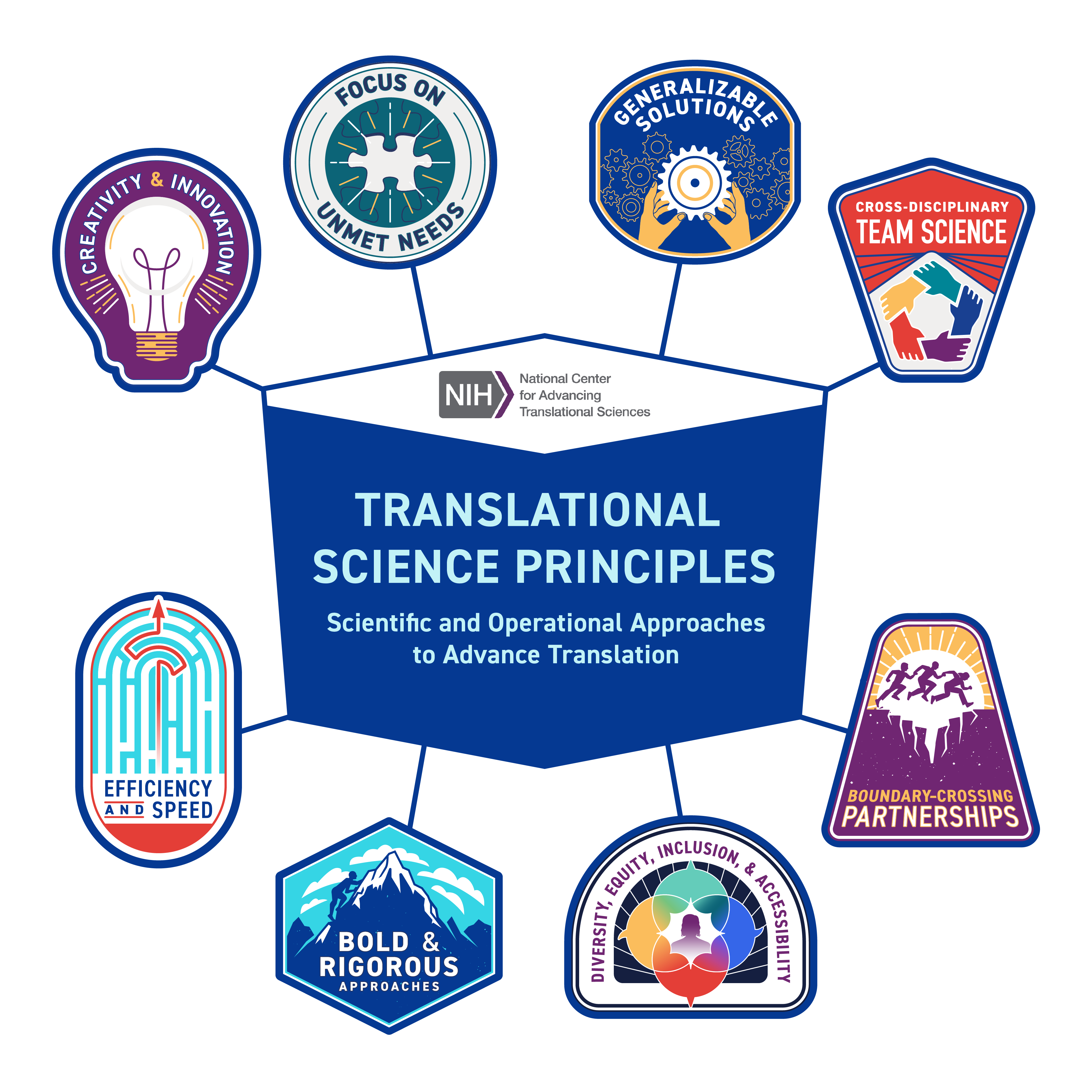Translational Science
What is it?

NCATS defines Translational Science as "the field of investigation focused on understanding the scientific and operational principles underlying each step of the translational process."
Whereas translational research focuses on the specific case of a target or disease, translational science is focused on the general case that applies to any target or disease.
A key tenet of translational science is to understand common causes of inefficiency and failure in translational research projects (e.g., incorrect predictions of the toxicity or efficacy of new drugs, lack of data interoperability, ineffective clinical trial recruitment).
Translational Science identifies barriers to the advancement of research across the translational spectrum, works toward a product or approach that overcomes or mitigates that barrier, and is generalizable across multiple diseases/conditions.
NCATS works with researchers, the public, and other stakeholder groups to design new approaches and technologies that ultimately will deliver more treatments to more people more quickly.
Learn more about Translational Science at ncats.nih.gov.
Clinical & Translational Research
Clinical Research
Research with human subjects that is:- Patient-oriented research. Research conducted with human subjects (or on material of human origin such as tissues, specimens, and cognitive phenomena) for which an investigator (or colleague) directly interacts with human subjects. Excluded from this definition are in vitro studies that utilize human tissues that cannot be linked to a living individual. It includes: (a) mechanisms of human disease, (b), therapeutic interventions, (c) clinical trials, or (d) development of new technologies.
- Epidemiological and behavioral studies.
- Outcomes research and health services research.
Translational Research
Translational research includes two areas of translation. One is the process of applying discoveries generated during research in the laboratory, and in preclinical studies, to the development of trials and studies in humans.
The second area of translation concerns research aimed at enhancing the adoption of best practices in the community. Cost-effectiveness of prevention and treatment strategies is also an important part of translational science. **
How Research Works
The NIH has published an article explaining how research works, to help put the process of science into perspective. It is a useful resource to help explain why science changes—and why it's important to expect that change. View the article at www.nih.gov and the accompanying graphic: How Research Works: Understanding the Process of Science (pdf) | en español (pdf)
Health/Research Priorities
NC TraCS aims to enhance wellness and reduce the burdens of disease by supporting basic, clinical and population research; dissemination and implementation science; comparative effectiveness and health services research; development of new methods and best practices; approaches aimed at individual, family, community, institutional and universal application; and efforts aimed at prevention, treatment and cure of disease.
We partner with a number of community groups throughout North Carolina, particularly Healthy Carolinians, to identify health priorities in the state. Though we support efforts to enhance wellness and reduce the burden of all diseases, the following priorities have been identified for the 2018-2023 funding period:
- Cancer
- Obesity
- Mental Health & Substance Abuse
- Delivery and Access
- Childhood and Youth Issues
- Chronic Disease
- Infectious Disease
- Injury and Violence
- Environmental Health
Participate in Clinical Research
Interested in helping advance promising treatments and medical care? Participate in a clinical trial. Research for Me @UNC and ResearchMatch.org can help pair you with studies you may find interesting.
On average, it takes the participation of 5,300 study volunteers to obtain the results needed for a new drug application. If you are looking for a clinical research study at UNC-Chapel Hill, search our local databases for appropriate opportunities as well as link with specific study coordinators in the area(s) of research for which you are most interested. Visit the Center for Information and Study on Clinical Research Participation (CISCRP) for more information about clinical research and questions you should ask before volunteering.
In addition to participating in a clinical research study, we offer opportunities for you to guide and support health research on the UNC-Chapel Hill campus and in your community. Connect with our Community and Stakeholder Engagement Program to learn more about the ways you can contribute to and inform the design and conduct of research at UNC.
Additional questions not covered here? Let us know.
*Modified from the NCI translational research working group (2006)
** Source: grants.nih.gov
Contact Us
Brinkhous-Bullitt, 2nd floor
160 N. Medical Drive
Chapel Hill, NC 27599
919.966.6022
This email address is being protected from spambots. You need JavaScript enabled to view it.
© 2008-2024
The North Carolina Translational and Clinical Sciences (NC TraCS) Institute at The University of North Carolina at Chapel Hill
The content of this website is solely the responsibility of the University of North Carolina at Chapel Hill and does not necessarily represent the official views of the NIH accessibility | contact



